| << Prev | Intro | Day 1 | Day 2 | Day 3 | Day 4 | Day 5 | Day 6 | Day 7 | Day 8 | Day 9 | Next >> |
Day 4, Sunday, June 11 - Frost Lake to Bologna Lake
We are both awake shortly after sunrise, and head down to the shore to take some pictures of the mist on the lake. Though not a lot better, my knee is certainly no worse than it was the day before, so we make the decision to continue on to the Frost River today. The portages will no doubt be uncomfortable, but I hope that by keeping the knee active it will also stay loose.
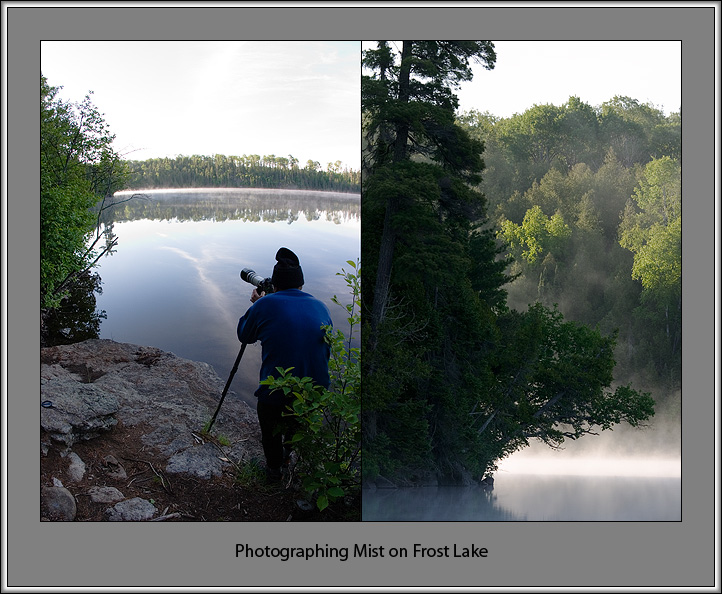
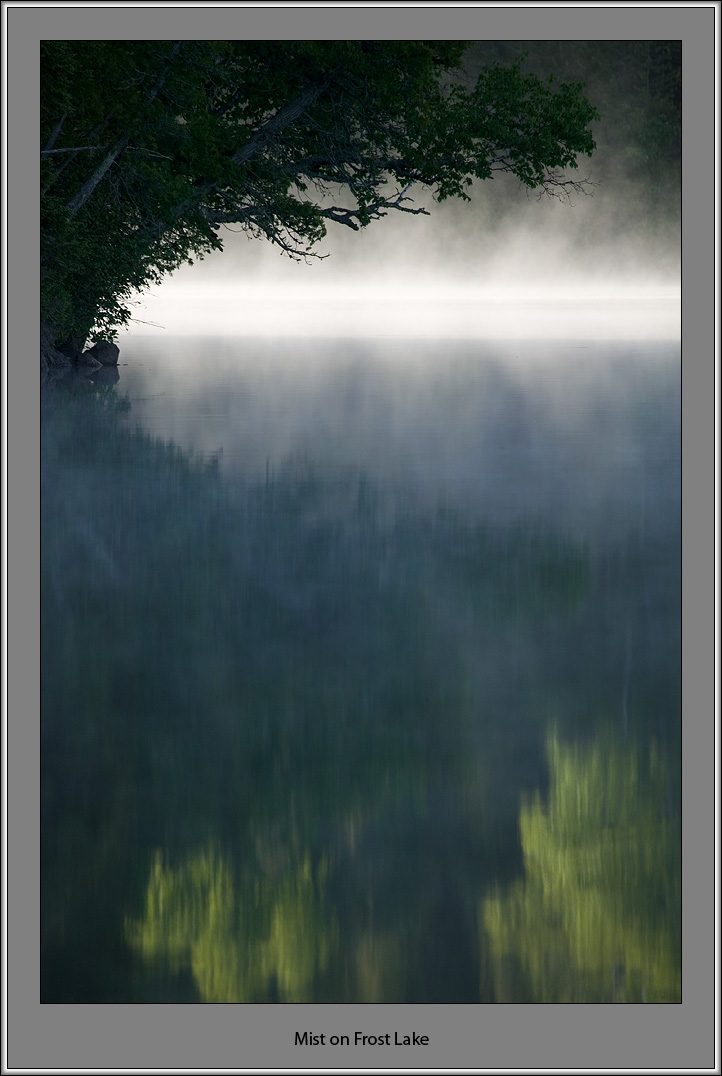
Unfortunately, due to the uncertainty yesterday over our plans for today, we had made the mistake of not getting ready for an early morning departure. Even though it's a relatively short distance to Bologna Lake, there is no guarantee that the campsite there will be available. If forced to move on to the next site at Afton Lake, we'd be in for a very long, tough day. I was upset with myself for letting this important detail slip.
Nevertheless, we do our best to get packed up quickly, but we've already wasted valuable hours by the time we finally pull away from our campsite and point the canoe west toward the portage out of Frost Lake. It's good to be paddling again, and as we head across the water we pass an unusual "rock" that sticks up out of nowhere in the middle of the lake. This formation must be the tip of some large underwater peninsula, and it makes our canoe seem very small as we glide over the presumably submerged, unseen land mass. Except for this rock, we seem to have the entire lake to ourselves. Earlier this morning, we had seen one canoe heading out the opposite side of the lake, but now there is no sign of anyone. We don't know it at the time, but it will be quite a while before we see another person.
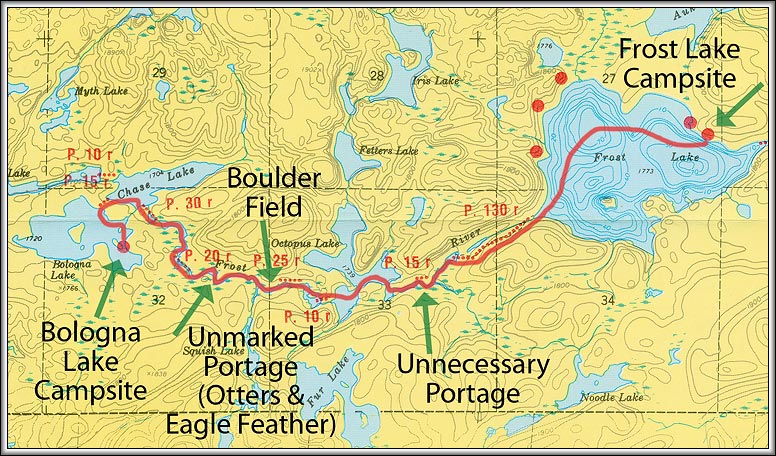
The first portage of the day, though a lengthy 130 rods, is not too bad, and my knee seems to be holding up well enough. The portage itself is a very pretty one, with various wildflowers lining its path and lots of paper birch popping out from among the spruce trees. Most of the way, we can hear water off to the side of us rushing over falls and rapids as it drains from Frost Lake. On the other side of the portage, we finally reach the spot I had been seeing in my mind on countless nights before while buried in the region's maps. Before us is the Frost River and a reunion with the secluded waterways we first fell in love with at Hog Creek, and then later when we paddled on Pagami Creek into the Weasel Lake PMA.
The remote rivers and creeks of the boundary waters hold a special character all their own. There's a unique intimacy between paddler and the enclosed surroundings that you don't always get on the larger lakes. The closeness of the natural world on all sides causes one to be less an observer and more a participant. Each time the canoe skims through a patch of reeds, scrapes past a rock or slides over a tree, you touch the wilderness and become an active part of it. Don't get me wrong, I love the lakes of the boundary waters, but these remote river sections are what really keep me awake at night thinking about that next trip.
Even before our paddles first break the surface of the Frost River, Heidi and I are already looking in all directions for moose. This is supposedly prime moose habitat, and we don't want to miss a single opportunity to see one. But unfortunately today, the moose must be off eating the vegetation in some other part of the river, since we don't spot any.
As we approach the next portage leading into Octopus Lake, it becomes apparent that taking it won't be necessary, presumably due to high enough water levels. Instead we slip through a narrow rocky channel and into spectacular Octopus Lake. If there had been a campsite on this lake, I could have stopped on the spot and spent the rest of our time right here. But with no such luck, I paddle on with mouth agape.
The next portage out of Octopus Lake returns us once again to the Frost River and is the first in a series of five short portages that all arrive in rapid succession before ending at Chase Lake. This relatively short one mile stretch of river is likely the slowest one mile of progress we will make the entire trip and is a prime example of why traveling light can be oh so important on trips like this. The constant loading and unloading of packs soon gets tiresome, and the roughness of the portages begin to wear us down. One portage in particular ends at a boulder field with no real landing to speak of. One slip here could easily end our trip in an instant, so we take extreme care, balancing every step.
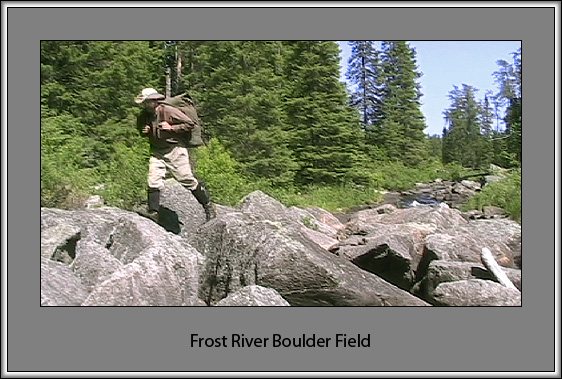
Further on, at a bend in the river, we discover a portage bypassing a beautiful little waterfall that's not on any of our maps. We had thought we were one up on the game after slipping by the portage into Octopus Lake, but this one evens the score. It's a quick up and down to the other side, and as we're moving our gear we notice that someone's shoe is apparently marking one end of the trail, and a hat the other. We wonder whether these are voluntary donations to the forestry service or evidence of someone's failed attempt to navigate the falls. Either way we leave them to help draw attention to the otherwise unmarked portage.
On the other side of the portage, we notice a number of disturbances in the water just beyond the falls. At first we think it might be some beavers, but as they move closer it looks more like a group of about five otters playing together. They appear to watch us pack up our canoe with some curiosity, but don't seem all that concerned about our presence. As we shove off, an eagle, who must have been watching us from a nearby tree, jumps loudly from its perch and soars off down the river. It left with enough force to dislodge a feather in the air right above the water in front of us. We watch from the canoe as the feather spirals down into the water, and then paddle over to have a closer look. As we move away, I look back and capture one of those mental images that stick with a person for a very long time. There, placed before a beautifully front-lit boundary waters backdrop, framed by the falls, was this eagle feather rocking gently on the water. The image only lasts for an instant, not long enough to extract a camera from our bag, but I'm not sure a photo would have accurately captured the feeling of the moment anyway. It feels as if we are crossing over from one region of the wilderness to a deeper more spiritual one, and it seems I may have finally found that place I have been trying to reach since the planning of this trip first began many months ago.
A few tough portages later, we finally arrive on Chase Lake. It's late in the afternoon, evening is fast approaching, and we're both very tired. The campsite on Bologna Lake is just one more short portage away, just off the main river route to the south. Since another grueling stretch of Frost River stands between us and the next campsite ahead on Afton, Heidi and I appeal to the wilderness to forgive us our late start and let the site on Bologna be vacant.
The portage to Bologna begins with a tricky little rocky landing. It's clear from the heavier than normal brush along the way that this is not a well traveled path - at least not by humans anyway. We find ourselves dodging plenty of wolf scat along the way, and some of it looks rather fresh.
After our usual double portaging drill, we slog through the muddy landing at the other side and set off onto Bologna Lake. Heidi thinks she hears voices coming from somewhere across the lake, but we hope she's either just hallucinating or maybe hearing bullfrogs instead. In the wilderness, it's very easy for people to think that they hear voices traveling on the wind, especially for those of us who live in urban areas. Absent the rush of the freeway, one's ears become sensitive to all sorts of sounds that would otherwise be drowned out. These sounds have become so foreign to so many of us that it's all too easy to mistake the simple whistling of wind through the trees with the voices of far off campers.
I have my fingers crossed as we steer around the final bend to the campsite. There's an audible exhale of relief from both bow and stern as we discover that the site is empty - or mostly so, anyway. As we drag the canoe up onto the small granite shelf in front of the campsite, we notice a painted turtle next to the fire grate apparently laying eggs. Upon further investigation, we see another dozen or so turtle holes dotting the campsite, some still with hatched egg shell remnants lying nearby. The campsite doubling as a turtle hatchery suggests to me that it doesn't see a lot of human visitors and maybe also explains why there aren't any other sites around for miles. One thing is for sure, though. Landing here has helped me attain another of my trip's goals by reaching a place where one wild thing, at least, seemed genuinely surprised to see me.
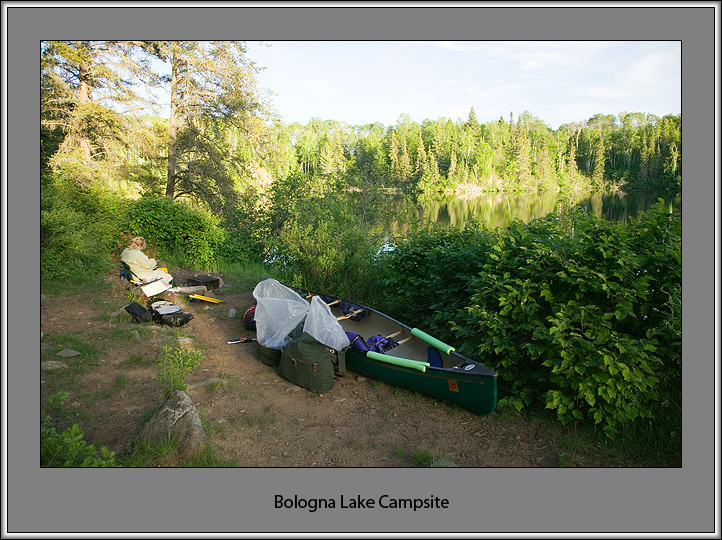
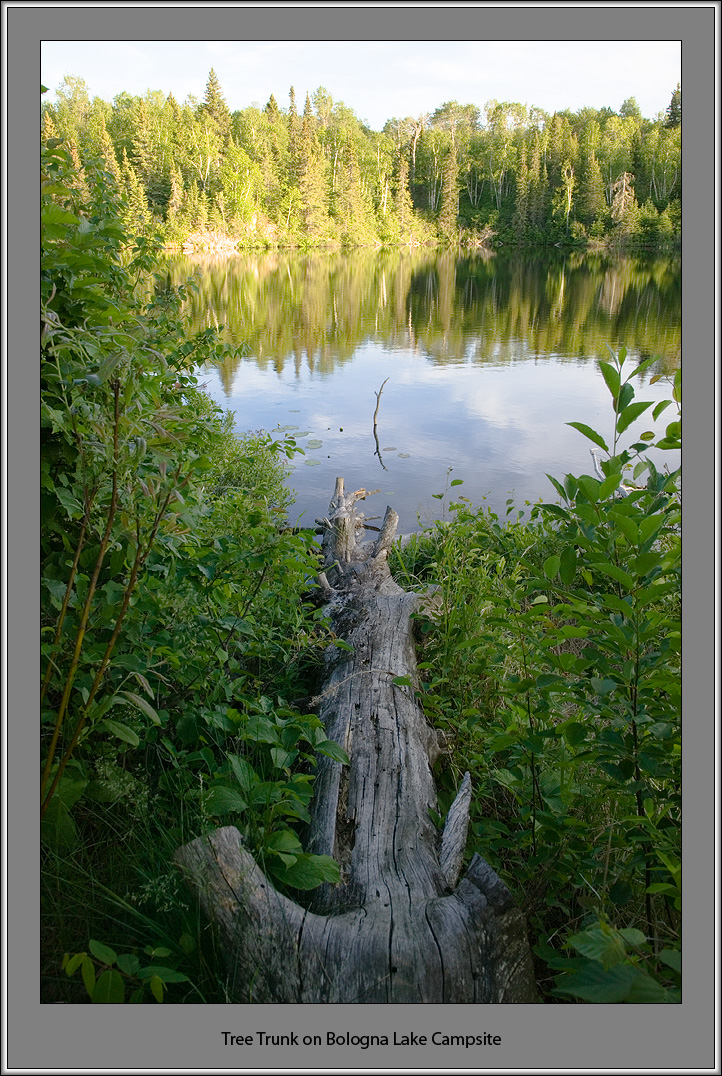
The assault from the day's portages has taken its toll on my knee, and as we wind down in front of the campfire it begins to tighten up significantly. We use this as an excuse to cash in another layover day tomorrow so we can really maximize our time here at this most remote and secluded point in our route. It's been another amazing day of experiences, and consistent with the pattern, the weather has remained dry, sunny and warm. From across the lake, hidden somewhere among the trees now set ablaze by the setting sun, a grouse rhythmically thumps away in hopes of attracting a partner with whom he can share this magnificent evening. I am grateful to have Heidi sitting here beside me in this unforgettable place and for our opportunity to share this special evening together.
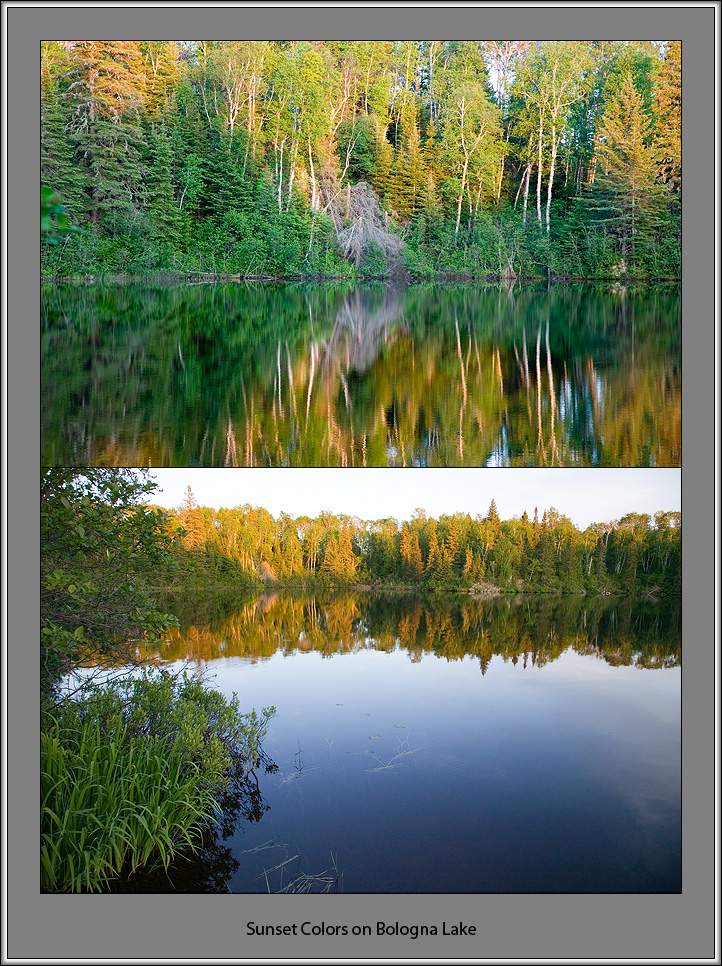

| << Prev | Intro | Day 1 | Day 2 | Day 3 | Day 4 | Day 5 | Day 6 | Day 7 | Day 8 | Day 9 | Next >> |